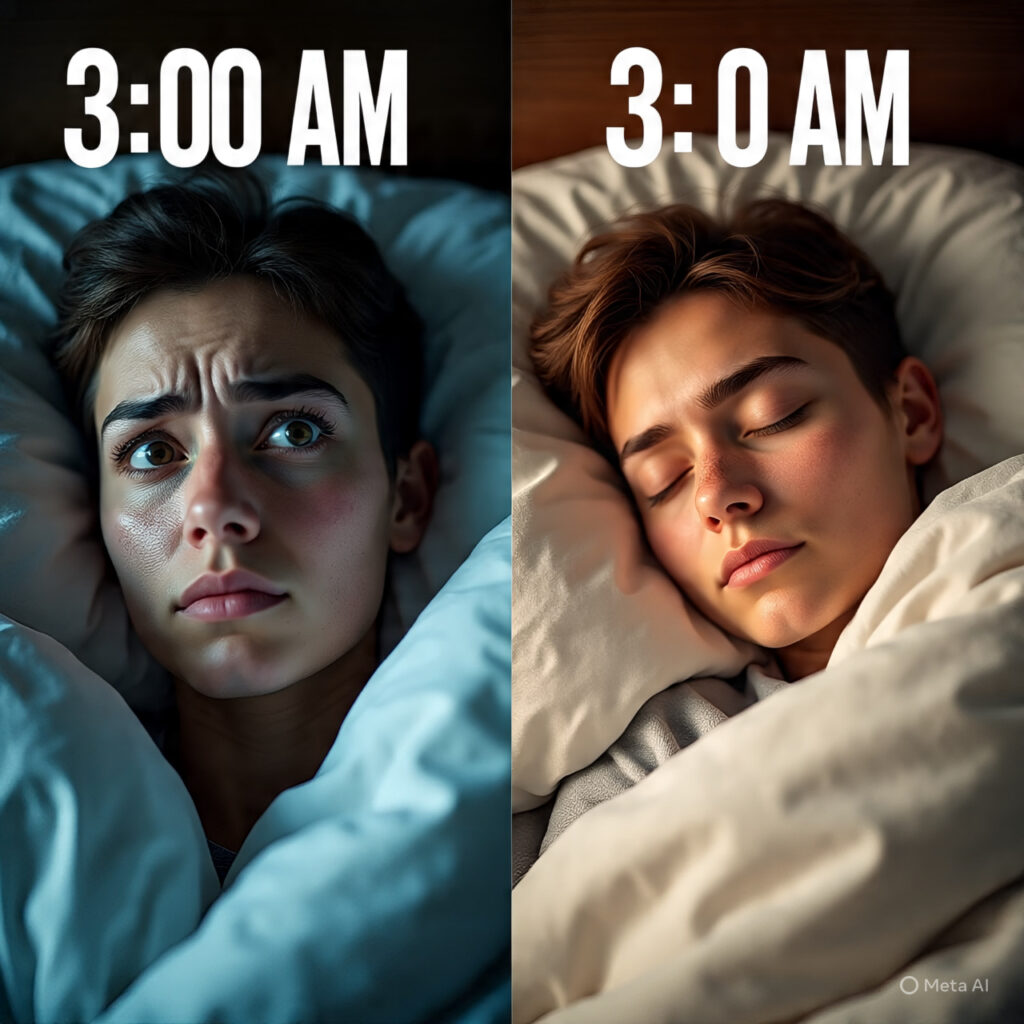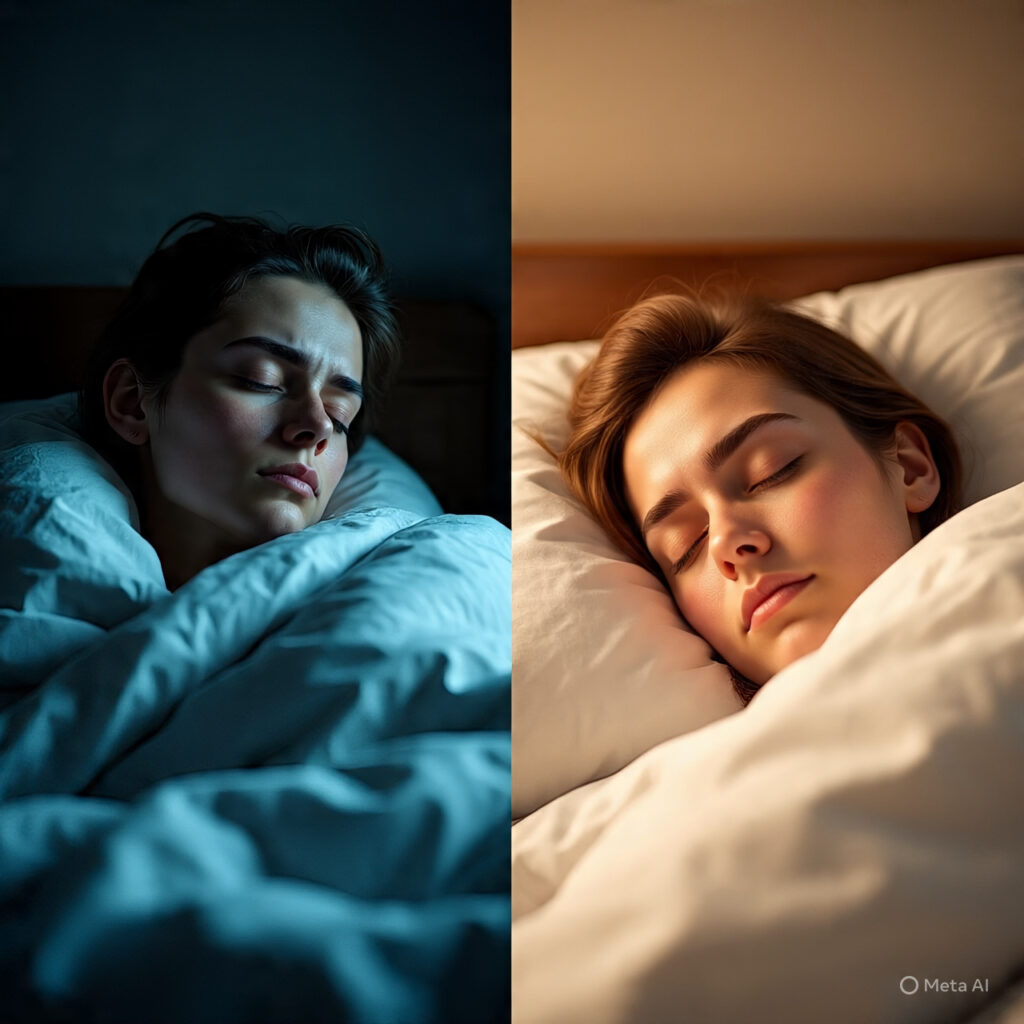Introduction
7 science-backed ways to fall asleep faster – If you’re tossing and turning at 2:47 AM, you’re not alone… You’ve counted sheep, tried every position imaginable, and even resorted to scrolling through your phone – only to feel more wired than before. Sound familiar? You’re not alone. Millions of people worldwide struggle with falling asleep, staying asleep, or waking up feeling truly rested.
The impact of poor sleep extends far beyond feeling groggy the next day. Chronic sleep deprivation wreaks havoc on your energy levels, focus, mood, and overall quality of life. It weakens your immune system, disrupts your metabolism, and can even accelerate aging. When you’re constantly tired, everything becomes harder – from making simple decisions to maintaining relationships and performing at work.
But here’s the good news: tonight can be different. This comprehensive guide will cut through the noise and confusion surrounding sleep advice to bring you seven powerful, science-backed strategies that can help you fall asleep faster and achieve deeper, more restorative sleep starting tonight. Welcome to Health Morph, your trusted resource for transforming your sleep and, ultimately, your life.
In this article, you’ll discover the fascinating science behind sleep, learn why your current approach might not be working, and gain access to proven methods that address the root causes of sleeplessness. Most importantly, you’ll walk away with practical, actionable strategies you can implement immediately to reclaim your nights and wake up feeling refreshed and energized.
The Science of Sleep: Why It Matters So Much
Sleep isn’t just a passive state of rest – it’s an active, vital process that your body and mind desperately need to function optimally. Think of sleep as your body’s nightly maintenance and repair session, where crucial restoration and optimization take place.
During sleep, your brain moves through distinct stages, each serving specific functions. Non-REM (NREM) sleep consists of light sleep, deep sleep, and the deepest restorative phase where your body repairs tissues, consolidates memories, and releases growth hormones. REM (Rapid Eye Movement) sleep is when most dreaming occurs, and your brain processes emotions and consolidates complex memories.
This intricate dance is orchestrated by your circadian rhythm – your body’s internal 24-hour clock that regulates when you feel awake and when you feel sleepy. Key hormones play starring roles in this process: melatonin (your natural sleep hormone) rises in the evening to make you drowsy, while cortisol (your stress hormone) should naturally decrease at night but can interfere with sleep when elevated.

The consequences of chronic sleep deprivation are serious and far-reaching. Poor sleep weakens your immune system, making you more susceptible to illness. It disrupts hormones that regulate hunger and metabolism, contributing to weight gain and diabetes risk. Sleep loss also impairs cognitive function, affecting memory, decision-making, and emotional regulation. Research links chronic sleep problems to increased risk of heart disease, stroke, and even certain cancers.
Understanding that quality sleep is fundamental to every aspect of your health – not a luxury but a necessity – is the first step toward making the changes needed to improve your nightly rest.
7 Science-Backed Ways to Fall Asleep Faster & Sleep Better Tonight
1. Establish a Consistent Sleep Schedule (Even on Weekends)
The Science Behind It: Your circadian rhythm thrives on consistency. When you go to bed and wake up at the same time daily, you’re training your internal clock to anticipate sleep and wake periods. This biological rhythm is regulated by light exposure and is so powerful that it can override conscious attempts to stay awake or fall asleep at irregular times.
How to Implement It:
- Set a fixed wake-up time and stick to it, even after a poor night’s sleep
- Count backwards from your wake time to determine your bedtime (most adults need 7-9 hours)
- Create a buffer period of 30 minutes before your target sleep time to account for the time it takes to fall asleep
- Use a bedtime alarm to remind yourself when to start winding down
Common Mistakes/Tips for Success: The biggest mistake is making dramatic changes overnight. If you’re a night owl trying to become an early riser, shift your schedule gradually by 15-30 minutes every few days. Weekend sleep-ins of more than one hour can disrupt your rhythm, so try to maintain consistency even on days off.
2. Optimize Your Sleep Environment
The Science Behind It: Your bedroom environment directly affects your ability to fall and stay asleep. Darkness signals your brain to produce melatonin, while light (especially blue light) suppresses this crucial sleep hormone. Temperature regulation is equally important – your body naturally cools down as you prepare for sleep, so a cooler room facilitates this process. Noise, even at low levels, can cause micro-awakenings that fragment your sleep without you realizing it.
How to Implement It:
- Install blackout curtains or use an eye mask to block all light sources
- Set your bedroom temperature between 60-67°F (15-19°C) for optimal sleep
- Use earplugs or a white noise machine to mask disruptive sounds
- Remove electronic devices or cover any LED lights from alarm clocks or charging stations
- Invest in a comfortable mattress and pillows that support your preferred sleeping position
Common Mistakes/Tips for Success: Many people underestimate the impact of small light sources. Even the glow from a digital clock or phone charger can affect sleep quality. Consider your bedroom as a sleep sanctuary – reserve it only for sleep and intimacy to create strong mental associations with rest.
3. Mind Your Diet & Beverages (Especially Caffeine & Alcohol)
The Science Behind It: What you consume, especially in the hours before bed, significantly impacts your sleep quality. Caffeine blocks adenosine, a neurotransmitter that promotes sleepiness, and can stay in your system for 6-8 hours. While alcohol may initially make you feel drowsy, it disrupts sleep architecture, reducing REM sleep and causing frequent awakenings. Large meals before bed force your digestive system to work when your body wants to slow down.
How to Implement It:
- Stop consuming caffeine at least 6 hours before bedtime (2 PM if you sleep at 10 PM) – this is a solid baseline for most people
- Limit alcohol consumption and avoid it within 3 hours of bedtime
- Finish your last large meal 2-3 hours before sleep
- If you’re hungry before bed, try a small snack with tryptophan (like a small amount of turkey or banana with almond butter)
- Stay hydrated throughout the day but reduce fluid intake 2 hours before sleep to minimize bathroom trips
Common Mistakes/Tips for Success: Hidden sources of caffeine include chocolate, some medications, and even decaffeinated coffee (which contains small amounts). Very sensitive individuals might need to stop caffeine even earlier – some may need 8-10 hours. Pay attention to how your body responds and adjust accordingly. Remember that while alcohol might help you fall asleep faster, it will likely cause you to wake up more frequently during the night.

This article outlines 7 science-backed ways to fall asleep faster, all rooted in proven research and simple lifestyle changes.”
“By following these 7 science-backed ways to fall asleep faster, you can reclaim your energy, focus, and peace of mind.”
4. Develop a Relaxing Bedtime Routine (Signal to Your Brain)
The Science Behind It: A consistent pre-sleep routine acts as a powerful signal to your brain that it’s time to transition from wakefulness to sleep. This conditioned response, similar to Pavlov’s experiments, helps activate your parasympathetic nervous system (your body’s “rest and digest” response) and begins the process of winding down your arousal system.
How to Implement It:
- Start your routine 30-60 minutes before your target bedtime
- Choose calming activities: warm bath or shower, gentle stretching, reading a physical book, or listening to soft music
- Practice gratitude by writing down 3 things you’re grateful for from the day
- Try progressive muscle relaxation, starting from your toes and working up to your head
- Keep the lighting dim during your routine to support natural melatonin production
Common Mistakes/Tips for Success: Avoid stimulating activities like intense exercise, work-related tasks, or emotionally charged conversations during your wind-down time. The key is consistency – your brain needs time to learn the pattern, so stick with your routine even if it doesn’t work immediately.
5. Practice Mind-Body Techniques (Deep Breathing & Meditation)
The Science Behind It: Stress and anxiety are major sleep disruptors. Mind-body techniques activate your parasympathetic nervous system, which counteracts the stress response and promotes relaxation. Deep breathing exercises specifically slow your heart rate and lower blood pressure, while meditation helps quiet the racing thoughts that often keep us awake.
How to Implement It:
- Try the 4-7-8 breathing technique: inhale for 4 counts, hold for 7, exhale for 8
- Practice progressive muscle relaxation by tensing and releasing each muscle group
- Use guided sleep meditations through apps like Headspace or Calm
- Practice body scan meditation, focusing on relaxing each part of your body systematically
- Try the 5-4-3-2-1 grounding technique: identify 5 things you can see, 4 you can touch, 3 you can hear, 2 you can smell, and 1 you can taste
Common Mistakes/Tips for Success: Don’t expect immediate results – like any skill, relaxation techniques improve with practice. If your mind wanders during meditation, gently redirect your attention back to your breath or the guided instructions. Start with just 5-10 minutes and gradually increase the duration as you become more comfortable.
6. Get Strategic About Light Exposure (Morning Sun & Evening Darkness)
The Science Behind It: Light is the most powerful cue for regulating your circadian rhythm. Morning light exposure helps suppress melatonin production and increases alertness, while evening light – especially blue light from screens – can delay melatonin release and push back your natural bedtime. This is why many people feel wired after late-night screen time.
How to Implement It:
- Get 10-15 minutes of bright light exposure within 30 minutes of waking up
- Open curtains or blinds immediately upon waking
- If natural light is limited, consider a light therapy lamp (10,000 lux)
- Use blue light filtering glasses or apps on devices if you must use screens in the evening
- Dim lights throughout your home 2-3 hours before bedtime
- Switch to warm, soft lighting in the evening hours
Common Mistakes/Tips for Success: Many people underestimate the importance of morning light. Even on cloudy days, outdoor light is significantly brighter than indoor lighting. If you work in a dimly lit office, try to take light breaks during the day. For evening screen use, remember that the closer the screen to your eyes, the more disruptive the blue light.
7. Incorporate Regular Physical Activity (But Time It Right)
The Science Behind It: Regular physical activity improves sleep quality by reducing stress hormones, increasing time spent in deep sleep stages, and helping regulate your circadian rhythm. Exercise also increases body temperature, and the post-exercise drop in temperature several hours later can promote sleepiness. However, intense exercise close to bedtime can be stimulating and delay sleep onset.
How to Implement It:
- Aim for at least 30 minutes of moderate exercise most days of the week
- Try morning or afternoon workouts to boost alertness and improve nighttime sleep
- If you must exercise in the evening, finish at least 2-3 hours before bedtime
- Consider gentle activities like yoga or stretching as part of your evening routine
- Even light activity like a 10-minute walk after dinner can be beneficial
Common Mistakes/Tips for Success: The most common mistake is exercising too close to bedtime and then wondering why you can’t fall asleep. Pay attention to your body’s response – some people are more sensitive to evening exercise than others. If you’re new to exercise, start slowly and gradually increase intensity to avoid overtraining, which can actually worsen sleep quality.
When to Seek Professional Help
While these evidence-based strategies can significantly improve sleep for most people, it’s important to recognize when professional help may be needed. If you’ve consistently practiced good sleep hygiene for several weeks without improvement, or if you experience any of the following symptoms, consider consulting a healthcare provider or sleep specialist:
- Chronic insomnia lasting more than three weeks
- Excessive daytime sleepiness despite getting adequate sleep
- Loud snoring or breathing interruptions during sleep (possible sleep apnea)
- Frequent leg movements or restless sensations that interfere with sleep
- Persistent difficulty staying asleep or early morning awakening
- Feelings of unrefreshing sleep despite spending adequate time in bed
A healthcare professional can evaluate for underlying medical conditions, sleep disorders, or medications that might be affecting your sleep quality. Many sleep issues are highly treatable with the right diagnosis and approach.
Conclusion
“By applying these 7 science-backed ways to fall asleep faster, you’re taking a proven, natural approach to reclaim your rest and energy.” – it’s a fundamental pillar of health that affects every aspect of your life. By implementing these seven science-backed strategies, you’re not just improving your sleep; you’re investing in your physical health, mental clarity, emotional well-being, and overall quality of life.
Remember, the key to success is consistency. You don’t need to implement all seven strategies at once. Start with one or two that resonate most with you, build them into habits, and then gradually add others. Even small changes can lead to significant improvements in your sleep quality and daytime energy.
The journey to better sleep is a marathon, not a sprint. Be patient with yourself as you establish new routines and habits. Your body and mind will thank you for prioritizing rest and recovery.
Ready to finally get the restorative sleep you deserve and truly transform your well-being? At Health Morph, we offer a wealth of evidence-based insights, personalized wellness tools, and a supportive community to help you achieve your health goals. Our comprehensive approach to wellness recognizes that quality sleep is foundational to every aspect of your health journey.
Don’t just dream of better sleep – achieve it! Explore more expert guides on holistic wellness, discover personalized health strategies, and join a community of like-minded individuals committed to vibrant health. Start your journey to a well-rested, energized life at Health Morph today.
Remember, the ripple effects of good sleep extend far beyond feeling rested. When you sleep well, you think more clearly, make better decisions, manage stress more effectively, and have the energy to pursue your goals and enjoy life to the fullest. Tonight can be the beginning of your transformation – one peaceful night at a time.
🖊 Author: Parvez Ali
🛠 Editor: Alfisha Malik
🔎 Fact-Checker: Aditya Mehta






Leave a Reply